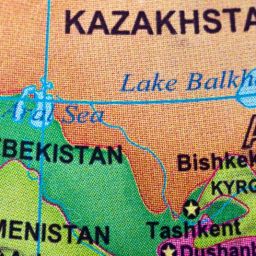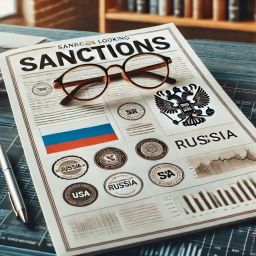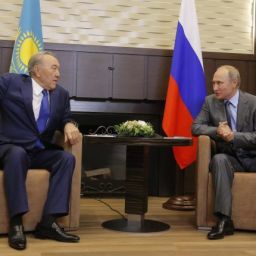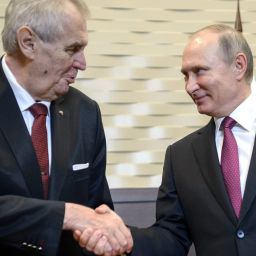This article is part of a collaboration between the Foreign Policy Research Institute and the Oxus Society for Central Asian Affairs.

The recent escalation in diplomatic tensions between the U.S., EU, China, and Russia is an unwelcome development for Central Asia. With the recent complicated visit to Moscow by the High Representative of the European Union for Foreign Affairs and Security Policy Josep Borrell marred by aggressive bilateral rhetoric, the White House labelling China as its major competitor, and recent verbal swordplay between President Biden and President Putin, it seems that a new “iron curtain” is quickly descending between the west, on one side, and Russia and China, on the other. These states are signalling a readiness to engage in a strategic competition which will possibly spread into different regions of the world, including Central Asia.
External regional partners may start insisting that they select one of them as a major political and economic ally, scuppering current efforts at multi-vectorism. Such policies will lead to increasing pressure on Central Asian leaders to clearly display their political alliances and to adhere to norms established within that camp.
This is already starting to occur. During his speech at Luzhniki Stadium in Moscow, President Putin stated unequivocally: “We will never tolerate [anyone] using Russia’s rich gifts to damage the Russian Federation.” While he did not name any particular country in his speech, it appeared that the statement was directed at the former Soviet republics, warning them to refrain from maintaining close partnerships with Russia’s adversaries. As several post-Soviet countries like Ukraine, Georgia and Moldova have entered into a long-term confrontation with Russia and are seeking alliances with the U.S. and European countries, Moscow has been intensifying its efforts to retain its sphere of influence, especially by integrating them into the Eurasian Economic Union (EAEU) and Collective Security Treaty Organization (CSTO).

At the same time, former U.S. Secretary of State Mike Pompeo attempted to rally Central Asians against Beijing during his visit to the region in February 2020, particularly with regards to the human rights situation in Xinjiang. He encouraged regional states “to join us in pressing for an immediate end to this repression.” Earlier, in October 2019, U.S. Secretary of Commerce Wilbur Ross warned that Uzbekistan’s desire to join the EAEU may complicate and extend the process of the country’s accession to the World Trade Organization. Despite the fact that the new U.S. Administration led by President Biden has not yet clarified its policy on Central Asia, it seems that his approach will not change substantially from the previous administration’s, and Washington will seek for the reduction of Russian and Chinese influence in the region.
China usually tries to avoid openly criticizing the activities of external powers in the region, preferring to discuss sensitive issues behind closed doors during bilateral meetings. However, Chinese-Central Asian joint official statementsdemonstrating a readiness to “oppose interference in other countries’ internal affairs and uphold fairness and justice in the world” appear to be aimed at the United States and the European Union. In addition, Chinese officials often express their concern about the growing U.S. military presence in the Asia-Pacific. One way to reduce Western forces there would be to expand security engagement in Central Asia.
Regionalism has also been on the rise in Central Asia since Shavkat Mirziyoyev came to power in Uzbekistan in 2016. Moving away from isolation and confrontation with the region, Uzbekistan has aimed to establish a new cooperative approach toward its neighbors. The five Central Asian republics launched a platform for annual consultative meetings among heads of state in 2018, the first such initiative without support from external powers. Before this, the prevalent tendency in the region was bilateral diplomacy and negotiations to solve pressing issues. This offers a renewed hope that Central Asian states can collectively address common challenges such as water distribution, delimitation of borders, low connectivity, climate change, and poor infrastructure.
Boosted regional cooperation in political, socio-economic and cultural spheres can substantially strengthen Central Asia and maintain its resilience in the face of contemporary challenges and threats, including great power competition. Multilateralism will allow the region to develop a strong, unified voice in promoting its interests while avoiding being drawn into the zero-sum games of great powers.
However, Russia and China have been mainly prioritizing bilateral relations with the region, alongside their own multilateral frameworks such as the Commonwealth of Independent States (CIS), Shanghai Cooperation Organization (SCO), and the aforementioned CSTO. The establishment of effective intra-regional cooperation mechanisms potentially counteracts great power efforts to lock regional states into relations of dependence. The fact that the U.S. and the EU are promoting the further deepening of regional cooperation, may lead Russia and China to view them as a threat. This may explain the new 2018 Russia-Central Asia platform and the 2020 China-Central Asia counterpart.
Finally, the escalation of confrontation between external great powers might threaten the internal political stability of regional actors. Major powers can actively support and patronize internal political groups who will support their interests. This is already happening in Kyrgyzstan. For example, the issue of the military presence of the U.S. and Russia there was an important factor in destabilizing the country. During the past 15 years, Kyrgyzstan has faced three revolutionary regime changes. Moreover, it has become tradition for all leading candidates for the Kyrgyz presidency to visit Moscow and other important foreign capitals on the eve of decisive elections or crucial political events. According to some reports, former Kyrgyz President Jeenbekov cancelled his planned visit to the U.S. after talks in September 2019 with Russian leadership. Experts also note that Sadyr Japarov had personally worked with Chinese nationals,with some 1 million Kyrgyzstani som ($11,794 USD) raised by his 2020 presidential campaign donated by a Chinese investor holding Kyrgyz citizenship.
Altogether, Central Asia is entering a period of growing geopolitical rivalry between its major external partners. This will possibly spread confrontation between the U.S., Russia and China into Central Asia, establishing alliances and forcing regional actors to pick sides – heightening the risk of destabilization. But there are still alternative options for the region. The further deepening of Central Asian cooperation, foreign policy coordination, and trust-building measures can act as a bulwark against great power destabilization.
The views expressed in this article are those of the author alone and do not necessarily reflect the position of the Foreign Policy Research Institute, a non-partisan organization that seeks to publish well-argued, policy-oriented articles on American foreign policy and national security priorities.






